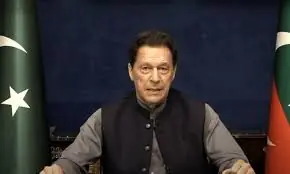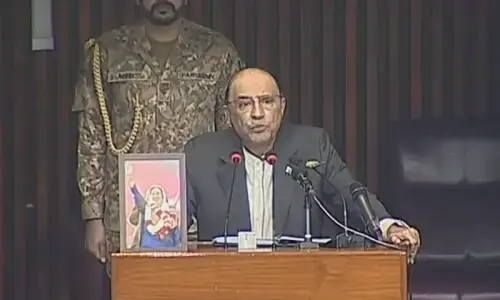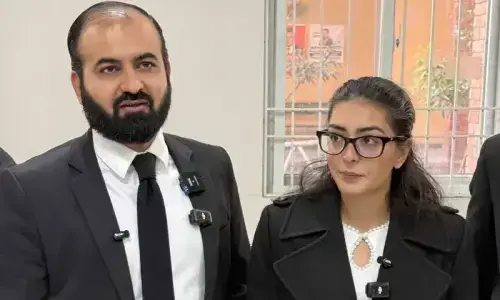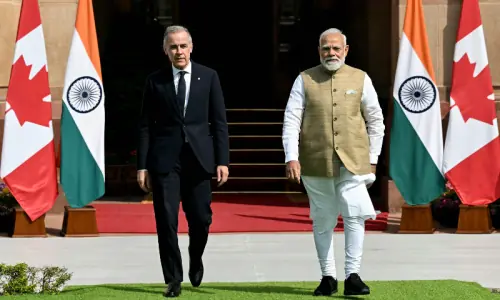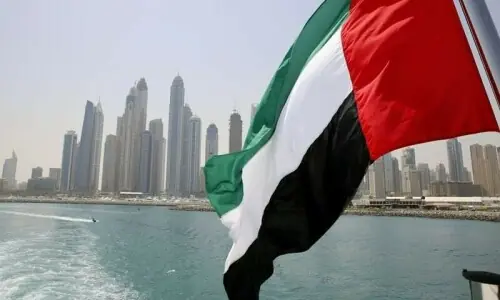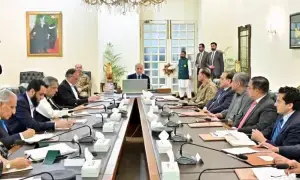Pakistan, Turkey and Azerbaijan on Wednesday agreed to strengthen cooperation in diverse fields and people-to-people ties, as well as continue to support each other on all issues involving the three countries' national interests.
The understanding was reached between the foreign ministers of the three nations at the second Pakistan-Turkey-Azerbaijan trilateral meeting, hosted by Islamabad.
The meeting concluded with the signing of an agreement, titled 'Islamabad Declaration', which said the three countries were desirous of further deepening cooperation in all areas of mutual interest including political, strategic, trade, economic, peace and security, science and technology, and cultural fields.
The ministers discussed the challenges and emerging threats confronting their countries including "foreign-sponsored acts of terrorism", cyber-attacks, hybrid forms of warfare, targeted disinformation campaigns, and escalating trends of Islamophobia, according to the joint statement.
They expressed serious concerns on the "grave human rights violations and crimes against humanity" committed against Muslim communities in various parts of the world, and reiterated their unequivocal support for safeguarding the territorial integrity and inviolability of international borders of their respective states.
The ministers agreed to enhance joint efforts on combating Islamophobia, discrimination and persecution of Muslim minorities, in particular at regional and international fora.
According to the declaration, the three ministers also reaffirmed the most recent Organisation of Islamic Cooperation (OIC) resolution on the Jammu and Kashmir dispute adopted in Niamey in November and "expressed deep concern over the unilateral actions of August 5, 2019, continuing grave human rights violations in and efforts to change the demographic structure of Jammu and Kashmir", reiterating their position for a peaceful settlement of the dispute in accordance with the relevant UN Security Council resolutions.
While discussing the far-reaching implications for economic growth and public health of the Covid-19 pandemic, the ministers agreed to exchange information, expertise and best practices, and called for enhanced international cooperation to effectively address the challenge, keeping in view "financial and capacity limitations of developing countries".
Speaking at a joint press conference after the meeting, Foreign Minister Shah Mehmood Qureshi reiterated the brotherly relations of Pakistan with Turkey and Azerbaijan, saying the three countries had resolved to enhance cooperation amongst them.
He said the ministers had exchanged views on trade, investment, people-to-people relations, security and other subjects. They also discussed how to deal with common challenges such as the coronavirus pandemic and Islamophobia, as well as human rights violations against Muslim minorities across the region.
"We want to enhance [our] linkages through parliamentary exchanges, enhanced media interaction and collaboration between our think tanks, artists and tourists," Qureshi said, adding that his Turkish and Azeri counterparts had appreciated Pakistan's role in the Afghan peace process.
"We reiterated our determination to support one another on all issues of our core national interests," he added.
During the meeting, the three ministers decided to intensify cooperation for enhancing trilateral trade and investment and encouraged their respective ministries to develop a robust action plan with concrete recommendations regarding easing of duties, tariff and non-tariff barriers, transportation costs, better coordination among the banking sectors and protection of mutual investments.
Foreign Minister Qureshi said the people of Pakistan and Kashmiris remained "profoundly grateful" to Turkey and Azerbaijan for their "principled and steadfast support" on the Jammu and Kashmir dispute. He said he had informed the ministers about the evolving situation and the "dire situation of human rights violations" in Indian-occupied Kashmir, including the prolonged military siege and "deliberate, unilateral and illegal actions" to make demographic changes in the valley.
Qureshi also reiterated Pakistan's resolute support for efforts towards a comprehensive settlement of the Cyprus issue on the basis of "political equality of the two communities". He said Pakistan had consistently called for the resolution of the Nagorno-Karabakh conflict in accordance with UN Security Council resolutions.
"We exchanged views on how to increase cooperation to combat all forms of terrorism including terrorism sponsored by foreign states," he told the presser.
He said the Turkish and Azerbaijani ministers were also briefed on "state-sponsored terrorism in our region in an attempt to destabilise Pakistan", as well as the anti-Pakistan Indian disinformation campaign exposed by EU Disinfo Lab.
Qureshi said the meeting had agreed that "all regional and global issues must be resolved through dialogue and peaceful means within the framework of international law."
'Strong cooperation'
In his remarks, Azerbaijani Foreign Minister Jeyhun Bayramov thanked Pakistan and Turkey for supporting Baku during the second Karabakh war and for condemning "Armenian occupation and war crimes".
"They raised their voices in the international arena to restore justice and we highly appreciate this principled position by Turkey and Pakistan," he said.
Bayramov said the three nations shared very strong bonds, the most important of which was a common vision and a "solid foundation for growing cooperation".
"They believe in strong cooperation on sovereign policy. We condemn aggression and terrorism, and reject Islamophobia," he added.
Noting that the three countries are located on ancient trade routes, he said cooperation between them will create jobs and contribute to raising the quality of life.
Bayramov invited Turkish and Pakistani companies to participate in the reconstruction and rehabilitation of "lands freed from Armenian occupation", saying "we will be glad of your cooperation to bring this land back to life."
Enhancing trade potential
Turkish Foreign Minister Mevlut Cavusoglu said he was very pleased to visit "brother Pakistan once again", and thanked Qureshi for organising a successful trilateral meeting.
"Pakistan has a unique place in our hearts and we support each other in difficult times and the help during the pandemic is an example," the Turkish minister said, adding that his country wanted to hold the seventh meeting of the high-level strategic council in Turkey.
He noted that the trade volume between Pakistan and Turkey was around $800 million. "Obviously it doesn't reflect the true potential of both the countries so we want to bring dynamism in our economic cooperation," he said.
"The strategic framework signed by President [Recep Tayyip] Erdogan and Prime Minister [Imran] Khan during the previous meeting in Islamabad provides the necessary roadmap. We are happy to see Turkish investors in Pakistan and we are encouraging [them] to increase their investment. There are around 100 Turkish companies active and we are expanding our cooperation in the defence industry as well," he added.
On the subject of cooperation for educational opportunities, Cavusoglu lauded the fact that 83 Pak-Turk Maarif schools were operating in Pakistan. He announced that the Turkish Maarif Foundation will set up more schools and a university in Pakistan.
"We agreed to continue working together to advance security, stability and prosperity," he said of the trilateral meeting.
He said the three ministers had underlined the importance of connectivity and developing an infrastructure for transport and discussed a joint response to regional developments including regarding Kashmir, Nagorno-Karabakh, Cyprus, the Mediterranean and situation in Afghanistan.
"We express our full support with Kashmiri brothers in the face of worsening human rights situation and demographic change especially during the last two years," the Turkish foreign minister said.
"We believe unilateral steps complicate the situation further and reaffirm our concerns and expectations which were also recently addressed in the OIC (Organisation of Islamic Cooperation) meeting in Niger," he added, stressing the use of dialogue to resolve issues in accordance with relevant UNSC resolutions.
Cavusoglu appreciated Pakistan's support to Azerbaijan to "liberate their territories", saying Turkey hoped that Armenia "seizes the opportunity for lasting peace".
The Turkish minister said he was honoured to be conferred the Hilal-i-Pakistan by President Dr Arif Alvi, terming it a sign of the countries' friendship. He concluded with: "Turkey-Pakistan-Azerbaijan dosti zindabad!"
Trilateral meet
The Turkish foreign minister had arrived in Pakistan on Tuesday night while the Azeri minister landed today. The first trilateral meeting between the three countries was held in Baku in 2017.
The foreign ministers were expected to discuss various issues including "new and emerging threats to regional peace and security", challenges due to the Covid-19 pandemic and climate change. The three sides were also to discuss measures that should be taken to achieve development targets, an earlier statement by the FO had said.
Additionally, the three countries were to explore possibilities of deepening trilateral cooperation in all areas of common interest, including peace and security, trade and investment, science and technology, education and cultural cooperation, it added.














